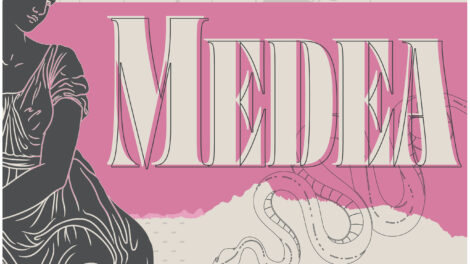Lafayette Theater Department announces
Open Auditions
for
Euripides’
Adapted and Directed by Professor Melissa Livingston
AUDITION DETAILS
Initial auditions will be in person Mon, Dec. 1 from 7pm-10pm in The Studio Theater
Please prepare a 1-2 minute monologue of your choice.
Sign up for an audition time.
Please fill out this Audition Form.
THE CHARACTERS
Actors of all races, nationalities, sizes, and abilities are encouraged to audition.
Medea: any race or ethnicity (Female Presenting)- A brilliant, powerful outsider whose love for Jason has consumed and destroyed her. Medea moves from shattered grief to razor-sharp focus to terrifying resolve. Requires a wide emotional and vocal range: raw sobbing, quiet calculation, fury, and chilling stillness. Strong text skills and comfort with heightened language, ritual, and physical storytelling. Must be able to sustain intense scenes of anguish and violence.
Jason: any race or ethnicity (Male Presenting) – Charismatic, ambitious, and deeply self-justifying. Jason sees himself as the hero and victim of his own story. He can be charming, tender, manipulative, cruel, and self-righteous—often within the same scene. The actor should be able to play both genuine affection and chilling emotional detachment. Strong presence; this character is used to walking into a room and assuming power belongs to him.
Chorus (Chorus 1–5)
Any race or ethnicity. Ensemble of 5, Female Presenting
The Chorus functions as
· The collective voice of the women of this land
· Witnesses, commentators, and sometimes advocates for Medea
· A physical and vocal “engine” for the piece
They create soundscapes (heartbeat rhythms, chanting, overlapping text), ritual movement, and images.
All chorus members must be comfortable with:
· Vocal work: speaking in unison, overlapping lines, rhythmic text
· Physical work: stylized movement, simple choreography, creating strong stage pictures
· Ensemble creation: working closely and responsively with each other
Chorus 1: (Female Presenting) – Often the “leader” of the Chorus. Strong speaker, empathetic but clear-eyed. Frequently interacts directly with Medea and Tutor.
Chorus 2: (Female Presenting) – Passionate, emotionally open, attuned to themes of desire, justice, and moral conflict.
Chorus 3: (Female Presenting) – Analytical observer, often framing events and consequences.
Chorus 4: (Female Presenting) – Pragmatic, sometimes blunt, grounded in social reality and power structures.
Chorus 5: (Female Presenting) – Darker edge; quick to call for vengeance and name the violence of the world.
Creon: any race or ethnicity (Male Presenting) – King of this land. Patriarchal authority embodied. Creon is fearful of Medea’s power, but hides that fear behind misogyny, nationalism, and cruelty. Capable of small flickers of pity, but ultimately chooses control and image over compassion. The actor should bring a clear sense of status, entitlement, and menace, with moments of vulnerability when his daughter is threatened.
Aegeus: any race or ethnicity (Male Presenting) – Ruler of another land and long-time friend of Medea. Aegeus is the rare, truly honorable man in the play. Kind, somewhat weary, deeply longing for children. He offers Medea asylum and is a crucial pivot point—his oath gives her the safety she needs to enact her plan. Actor should bring warmth, sincerity, and a sense of integrity that contrasts sharply with Jason and Creon.
Tutor: any race or ethnicity (Male Presenting) – Caretaker/teacher of Medea and Jason’s sons. A gentle, grounded, morally centered presence in the play. The Tutor sees and articulates the love between Medea and her children and advocates for the boys’ well-being. Needs warmth, emotional intelligence, and the ability to navigate tension between loyalty to the children and fear of the adults’ power.
This is an original adaptation. You may think you know the story, but please read it before auditions.
COPY OF SCRIPT
If you cannot make it to the in-person auditions, please contact Prof. Melissa Livingston
before Monday, Dec. 1, 2025, for an alternative audition time.
Callbacks will be by invitation on Wed. & Thurs. Dec. 3 & 4 from 7 pm-10 pm.
If you have questions or need more information,
please contact Prof. Melissa Livingston at livingme@lafayette.edu.
